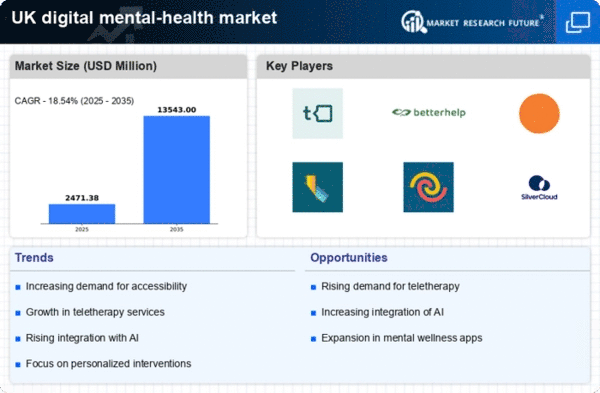Rising Mental Health Awareness
The increasing awareness surrounding mental health issues in the UK is a pivotal driver for the digital mental-health market. Campaigns and initiatives aimed at destigmatizing mental health have led to a greater acceptance of seeking help. According to recent surveys, approximately 75% of individuals now recognize the importance of mental well-being, which has resulted in a surge in demand for digital solutions. This heightened awareness encourages individuals to explore online therapy options, mobile applications, and other digital resources. As a result, the digital mental-health market is experiencing significant growth, with projections indicating a potential increase in market size by over 20% in the coming years. This trend suggests that as more people prioritize mental health, the digital mental-health market will continue to expand, offering innovative solutions to meet the evolving needs of the population.
Government Initiatives and Funding
Government initiatives and funding are instrumental in propelling the digital mental-health market forward. The UK government has recognized the importance of mental health and has allocated substantial resources to enhance digital mental health services. Recent reports indicate that funding for mental health initiatives has increased by approximately 15% over the past year, with a significant portion directed towards digital solutions. This financial support enables the development and implementation of innovative platforms that cater to diverse mental health needs. Additionally, government-backed campaigns promote the use of digital resources, encouraging individuals to seek help through online channels. As these initiatives continue to evolve, they are likely to foster a more robust digital mental-health market, ultimately improving access to care for those in need.
Integration of Holistic Approaches
The integration of holistic approaches into the digital mental-health market is emerging as a significant driver. There is a growing recognition that mental health is interconnected with physical health, lifestyle, and overall well-being. In the UK, many digital platforms are now incorporating holistic elements such as mindfulness, nutrition, and exercise into their offerings. This trend reflects a shift towards a more comprehensive understanding of mental health, where users are encouraged to adopt a multifaceted approach to their well-being. Research suggests that individuals who engage with holistic mental health resources report higher satisfaction and improved outcomes. As the digital mental-health market embraces these holistic approaches, it is likely to attract a broader audience, ultimately contributing to its growth and sustainability.
Technological Advancements in Digital Platforms
Technological advancements play a crucial role in shaping the digital mental-health market. The proliferation of smartphones and high-speed internet access has facilitated the development of sophisticated digital platforms that provide mental health services. In the UK, it is estimated that over 90% of adults own a smartphone, enabling easy access to mental health applications and online therapy. Furthermore, the integration of features such as video conferencing, chatbots, and personalized content enhances user engagement and satisfaction. These advancements not only improve the accessibility of mental health resources but also contribute to the overall effectiveness of digital interventions. As technology continues to evolve, the digital mental-health market is likely to witness further innovations, potentially leading to a more tailored and responsive approach to mental health care.
Increased Demand for Flexible Mental Health Solutions
The demand for flexible mental health solutions is a driving force behind the growth of the digital mental-health market. Individuals are increasingly seeking services that fit their busy lifestyles, leading to a preference for on-demand and remote mental health support. In the UK, surveys indicate that over 60% of individuals prefer digital platforms for therapy due to their convenience and accessibility. This shift towards flexibility allows users to engage with mental health resources at their own pace and on their own terms. Consequently, the digital mental-health market is adapting to meet these preferences, offering a variety of services such as asynchronous messaging, self-help tools, and virtual therapy sessions. This trend suggests that as the demand for flexible solutions continues to rise, the digital mental-health market will likely expand to accommodate these evolving consumer needs.
















